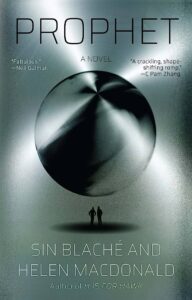Prophet is a mystery, a sci-fi adventure, a spy thriller, a queer romance, a military horror story, and satire about the weaponisation of nostalgia in our present cultural moment. It’s made from all the things we love, inspired by a lifetime of books, movies and tv shows, internet fanfiction and video games. We aimed to write a page-turner with a philosophical heart and a big damn love story at its core, building it from the familiar tropes that course through those media, from Bond films and spy stories to popular procedural TV mystery shows. Here are some of its literary inspirations:
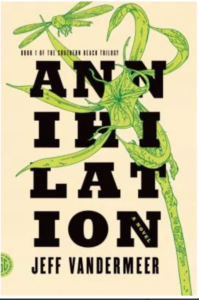
ANNIHILATION by Jeff VanderMeer
There is something so utterly soothing about how VanderMeer brings us into the world of the Southern Reach trilogy. The rhythm and building of atmosphere, the detached cataloging of surreal and often unexplainable happenings. A deep thread of uncertainty is woven throughout, and is well-hidden by purpose-built procedural language verging on military recording of events. It’s true that not many would find this particular brand of clinical horror soothing, but I adore the soft madness of it all. If placed under a microscope, you would see that there is shared DNA in Prophet; we aimed to provide a similar lulling, yet details-based, insanity in pivotal moments. (SB)

CHEW by John Layman with art by Rob Guillory
Some of the best detective stories, in my opinion, revolve around a singularly remarkable person just trying to get on with their otherwise regular job. Chew does this by making Tony Chu the most boring person with an astounding talent in an extraordinary situation, namely that he is a cibopath and can gain psychic impressions from anything he eats. His love of doing things by the book and knowing the importance of paperwork in a world so wild that he finds himself embroiled in a global conspiracy that involves illegal chicken consumption, cannibalism, and Russian operatives, is so obviously woven into the DNA of Prophet. Though our protagonists don’t deal with the same cartoonish peril that Agent Chu does, the chaos they face is equally tempered with their singular talent and stark stoicism (SB)
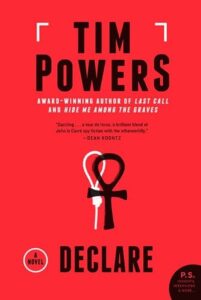
DECLARE by Tim Powers
Recommended to me by a friend who’s a Professor of Early Modern French literature and thought, this huge Cold War supernatural spy thriller meshes matters of historical fact with Catholicism and pre-Islamic religion, has a big romance at its centre, and is packed with eerie scenes that linger long and disturbingly in my memory. Declare was one of the books that finally let me ditch the unhelpful genre attitudes I’d held since a child, ones that put literature in a special box and genre fiction in a less special one. It’s so accomplished and serious but at the same time enormous fun. It definitely influenced Prophet in terms of writing about a mysterious entity whose true purpose is something human minds cannot grasp but which is recruited by bad actors for their own political ends. (HM)
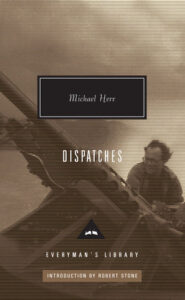
DISPATCHES by Michael Herr
Journalism screwed to such a pitch reporting the horrors of the Vietnam War that it achieves terrible and fantastic forms, like the unearthly flora of a JG Ballard story. Dispatches reads like a final confession, has the off-kilter musicality of beat literature, and it inspired Prophet in myriad ways. Its lyricism was at the forefront of my mind when we wrote the firefight-meets-acid-trip finale to our novel. But more centrally, it’s a book that questions what it means to write with fidelity to truth. Dispatches has received criticism for being a partly fictionalised account—but this seems to me to miss the point. What is truth in circumstances beyond rational imagining is a question Prophet makes much of—and what is the responsibility of the writer in trying to capture and communicate it. Dispatches is fiction and non-fiction at once, and it’s devastating either way. (HM)

TINKER TAILOR SOLDIER SPY by John le Carré
This Cold War novel is a host of perfections: a plot as complex, elegant and efficient as a watch-mechanism; devastatingly sharp evocations of class and British culture; Le Carré’s ability to conjure real character and vivid atmosphere in a sentence or two; the palpable weariness of George Smiley as he moves through a professional and personal world built on an inability to trust. In Prophet, Rao’s ability to detect truth-values in any propositional statement breaks everything espionage and mystery novels are based on; it’s a conceit that came from reading books like these. Writing any kind of spy fiction, you’re working with le Carré. His voice is always there, like the cadences of the King James Bible echoing through the English literary canon. It’s also very, very fun to imagine Rao meeting Smiley, and how that conversation would have gone (badly). (HM)
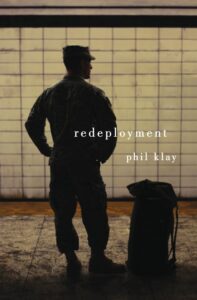
REDEPLOYMENT by Phil Klay
There are inspiring books, and there are books that inspire and inspire me to write. Redeployment is one of them. A collection of short stories in a dozen different voices, built from Klay’s experiences serving in the Marine Corps in Iraq and a wealth of research, the collection is a masterwork of narrative sophistication, psychological precision, brutality, tragedy, and humour. It burns with the sense of bearing witness and turns a world of which readers might never have had any experience into something they feel they know. Writing Prophet required a lot of deep-diving into military non-fiction, official documents, historical papers, biographies, and internet military message boards. But without this book, I don’t think I’ve have dared to write military sci-fi at all. (HM)
***


